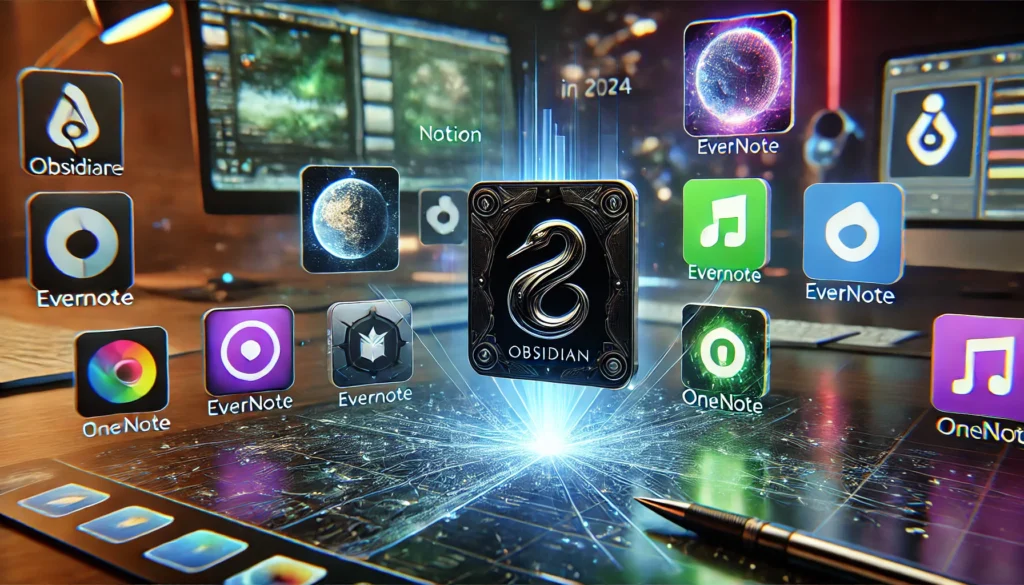Obsidian is a popular note-taking app that stands out for its focus on local storage, markdown-based editing, and a highly customizable interface. Here’s how it compares to other note-taking apps across various aspects:
1. Data Ownership & Privacy
- Obsidian: All notes are stored locally, meaning users have complete control over their data. Obsidian doesn’t sync data to the cloud unless users choose to set up their own sync solution or use Obsidian Sync (their optional, encrypted service).
- Evernote / OneNote: These are cloud-based by default, so while convenient, users are dependent on third-party servers for storing their notes.
- Notion: Highly collaborative but also cloud-based. It provides more flexibility with integration but requires trusting their servers.
- Apple Notes: Syncs across Apple devices using iCloud, which provides some privacy guarantees, but still depends on Apple’s ecosystem.
2. Customization & Flexibility
- Obsidian: Very flexible with plugins, community themes, and the ability to create custom workflows. Users can write scripts and add extensions, transforming it into anything from a task manager to a knowledge base.
- Roam Research: Similar flexibility in terms of linking and knowledge management but lacks the same level of UI customization. Roam’s graph view is similar but less customizable.
- Notion: Highly versatile in terms of database creation, integration, and templates. However, it’s less customizable in terms of UI and user-defined scripts.
- Evernote / OneNote: Offer basic customization, but not nearly as much as Obsidian. They are designed for quick setup and use rather than building a custom system.
3. Markdown Support
- Obsidian: Fully markdown-based, which means you can write using plain text and see a preview. This makes it lightweight and compatible with other markdown tools.
- Notion: Has markdown support, but it’s not as native as Obsidian’s. You often work with rich text features that need to be converted.
- Bear: Also markdown-based and popular among macOS users, but it lacks some of the flexibility and linking capabilities of Obsidian.
- Evernote / OneNote: These apps are focused more on rich text rather than markdown, making them less developer-friendly.
4. Linking and Knowledge Management
- Obsidian: Exceptional for creating a network of notes. It uses a “graph view” to visualize connections between notes, making it great for knowledge bases or personal wikis.
- Roam Research: Often seen as Obsidian’s main competitor in this space, Roam also excels in linking but requires a subscription and is cloud-based.
- Notion: Allows linking between pages, but it’s not as visual as Obsidian’s graph or as flexible as Roam’s bidirectional linking.
- Evernote / OneNote: These apps have tagging and linking capabilities but lack the deep, interconnected nature that Obsidian or Roam offer.
5. Offline Capability
- Obsidian: Fully functional offline since it’s local-first. Syncing options (via Obsidian Sync or third-party solutions like Git or cloud services) are optional.
- Notion: Has offline capabilities, but it is primarily designed for online use, which can be limiting if connectivity is unreliable.
- Evernote / OneNote: Both offer offline functionality but still depend on cloud storage for synchronization.
- Roam Research: Primarily online, with offline support being more limited.
6. Cost
- Obsidian: Free for personal use, with additional paid services like Obsidian Sync or commercial licenses available.
- Roam Research: Subscription-based, with a relatively high monthly fee.
- Notion: Free for individual users, with premium features available for teams or individuals wanting additional storage/integration capabilities.
- Evernote: Free tier available, but advanced features (offline access, more storage) are locked behind a subscription.
- OneNote: Free with Microsoft 365, but advanced features depend on having a Microsoft 365 subscription.
Summary
Obsidian is ideal for those who prioritize privacy, local storage, and extensive customization. It excels in knowledge management, markdown support, and offline capability. However, it may have a steeper learning curve compared to simpler, cloud-based apps like Evernote or Notion, which focus more on ease of use and integration.
If you want an app that functions as a local-first, markdown-powered knowledge base with a high degree of customization, Obsidian is likely the best option available today. However, if you prefer a cloud-based solution with collaboration features and visual databases, Notion might be more suitable.
